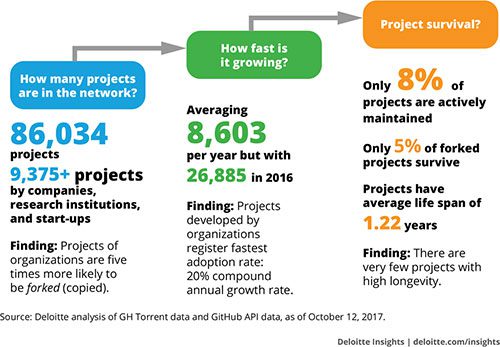Despite the buzz surrounding blockchain, most coding projects based on the technology don’t make their way to completion, according to a study from Deloitte.
Blockchain is best known as the distributed ledger technology that underpins Bitcoin and other cryptocurrencies. Established IT giants and new startups have embraced blockchain in the hopes of creating an ecosystem of secure transactions systems, trading platforms and other IT solutions that capitalize on the technology’s resistance to tampering.
Yet there are signs that developers may be running into stumbling blocks this early in the game.

Deloitte analyzed GitHub, the popular open-source code repository and collaboration platform, to examine the state of the blockchain development scene. GitHub boasts 24 million users and over 68 million projects.
Among them are many blockchain projects—Deloitte identified 772 different blockchain communities on the platform, each working on one or more projects—but unfortunately many suffer from a high mortality rate.
Only eight percent of all blockchain-related projects on GitHub are currently active (updated at least once in the past six months). Projects spearheaded by organizations (15 percent still maintained) fare better than those led by users (7 percent still active).
At last count, there are an estimated 86,000 blockchain-based repositories on GitHub. Of those, more than 9,375 projects hail from companies, startups and research groups. On average, more than 8,600 blockchain projects join GitHub each year.
It’s important to note that the vast majority of projects on GitHub are inactive (90 percent), regardless of type. On average, projects have a life span on just one year, while most flame out within the first six months.
Somewhat unsurprisingly, bitcoin and go-ethereum, from the Bitcoin and Ethereum groups, are the leading blockchain repositories on GitHub. The number three spot belongs to bitcoinjs-lib, while Electrum and cpp-ethereum, also from Ethereum, round out the top five.
Further analysis of the programming languages most used by blockchain developers indicates that many projects have fintech (financial technology) ambitions.
“Although not the most popular language when measured by number of blockchain repositories, we found that C++ was used most in the ecosystems’ central repositories,” stated the report. “This was not surprising, given that C++ has been used for some time in the financial services industry to develop applications that demand efficient memory management, speed, and reliability.”
Go from Google is also picking up steam, evolving from a “fringe language” to the second most popular programming language for blockchain projects, stated the report.
Pedro Hernandez is a contributing editor at Datamation. Follow him on Twitter @ecoINSITE.
Huawei’s AI Update: Things Are Moving Faster Than We Think
FEATURE | By Rob Enderle,
December 04, 2020
Keeping Machine Learning Algorithms Honest in the ‘Ethics-First’ Era
ARTIFICIAL INTELLIGENCE | By Guest Author,
November 18, 2020
Key Trends in Chatbots and RPA
FEATURE | By Guest Author,
November 10, 2020
FEATURE | By Samuel Greengard,
November 05, 2020
ARTIFICIAL INTELLIGENCE | By Guest Author,
November 02, 2020
How Intel’s Work With Autonomous Cars Could Redefine General Purpose AI
ARTIFICIAL INTELLIGENCE | By Rob Enderle,
October 29, 2020
Dell Technologies World: Weaving Together Human And Machine Interaction For AI And Robotics
ARTIFICIAL INTELLIGENCE | By Rob Enderle,
October 23, 2020
The Super Moderator, or How IBM Project Debater Could Save Social Media
FEATURE | By Rob Enderle,
October 16, 2020
FEATURE | By Cynthia Harvey,
October 07, 2020
ARTIFICIAL INTELLIGENCE | By Guest Author,
October 05, 2020
CIOs Discuss the Promise of AI and Data Science
FEATURE | By Guest Author,
September 25, 2020
Microsoft Is Building An AI Product That Could Predict The Future
FEATURE | By Rob Enderle,
September 25, 2020
Top 10 Machine Learning Companies 2020
FEATURE | By Cynthia Harvey,
September 22, 2020
NVIDIA and ARM: Massively Changing The AI Landscape
ARTIFICIAL INTELLIGENCE | By Rob Enderle,
September 18, 2020
Continuous Intelligence: Expert Discussion [Video and Podcast]
ARTIFICIAL INTELLIGENCE | By James Maguire,
September 14, 2020
Artificial Intelligence: Governance and Ethics [Video]
ARTIFICIAL INTELLIGENCE | By James Maguire,
September 13, 2020
IBM Watson At The US Open: Showcasing The Power Of A Mature Enterprise-Class AI
FEATURE | By Rob Enderle,
September 11, 2020
Artificial Intelligence: Perception vs. Reality
FEATURE | By James Maguire,
September 09, 2020
Anticipating The Coming Wave Of AI Enhanced PCs
FEATURE | By Rob Enderle,
September 05, 2020
The Critical Nature Of IBM’s NLP (Natural Language Processing) Effort
ARTIFICIAL INTELLIGENCE | By Rob Enderle,
August 14, 2020

Datamation is the leading industry resource for B2B data professionals and technology buyers. Datamation's focus is on providing insight into the latest trends and innovation in AI, data security, big data, and more, along with in-depth product recommendations and comparisons. More than 1.7M users gain insight and guidance from Datamation every year.
Advertise with TechnologyAdvice on Datamation and our other data and technology-focused platforms.
Advertise with Us
Property of TechnologyAdvice.
© 2025 TechnologyAdvice. All Rights Reserved
Advertiser Disclosure: Some of the products that appear on this
site are from companies from which TechnologyAdvice receives
compensation. This compensation may impact how and where products
appear on this site including, for example, the order in which
they appear. TechnologyAdvice does not include all companies
or all types of products available in the marketplace.